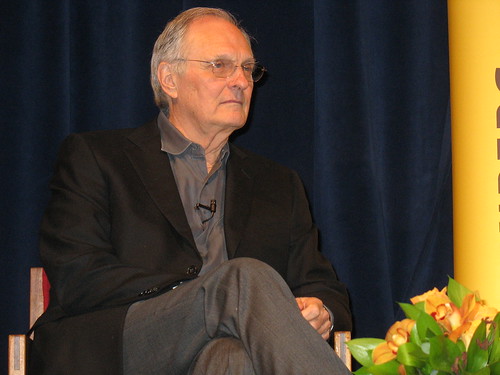Through the generosity of a friend, I got to attend a lecture by Alan Alda at the New Jersey Performing Arts Center, as part of the New Jersey Speakers Series sponsored by Fairleigh Dickinson University.
I knew very little about Alda's life other than his involvement with M*A*S*H, and was intrigued to learn about his upbringing. His father Robert Alda was an actor and his mother, Joan Browne, was a homemaker who struggled with mental illness and died when he was ten. As a child, he survived polio and endured his father's misguided attempt to console him over the untimely death of his cocker spaniel by having the poor animal stuffed (referenced in the title of Alda's memoir).
From a young age, Alda was brought along on the burlesque circuit with his parents. He vividly recalled life at age three, being collectively mothered by chorus girls and watching the show from the wings, triggering his ambition to follow his father into show-business. From that young age, he had an understanding of the inner workings of entertainment that few get to see. "I knew where he hid the pigeons," he said of the show's magician.
 |
| Alan Alda at USC in 2008 PHOTO CREDIT: Andy Carvin Used by Creative Commons License. Some rights reserved |
Among Alda's favorite memories of the show was the episode in which his father guest-starred as a visiting medic. Their characters each sustain injuries to one hand and perform an operation together, each using their "good" hand. This was the senior Alda's idea, which his son originally rejected but then agreed to use, and still cites as a major growth point in their relationship.
Besides M*A*S*H, among other acting and producing roles (including The Four Seasons and The West Wing, for which he was considered for the lead), Alda produced a series of interviews for PBS with scientists in various fields of study, which at one point took him to an observatory 8,000 feet up a Peruvian mountain. While there, he was struck with an intestinal malady requiring emergency surgery (ironically, a procedure with which Alda was familiar because his M*A*S*H character "Hawkeye" had to perform it). He described how surviving that experience made him feel incredibly alive and appreciative of the world around him, and resolved to keep that awareness and gratitude intact for the rest of his life.
Alda also founded and is an active part of the Alan Alda Center for Communicating Science at Stony Brook University on Long Island. Alda had realized, through his work interviewing researchers and other experts, that there is frequently a disconnect between these highly intelligent folks doing very important work, and those who need to understand its potential benefits. He gave an example of a congressional hearing where the politicians were clearly mystified by what was being presented, despite being charged with determining if it should be funded. The Alda Center is charged with helping science students communicate the purpose and importance of their work to those outside the discipline, including the media, government officials, and the public as a whole.